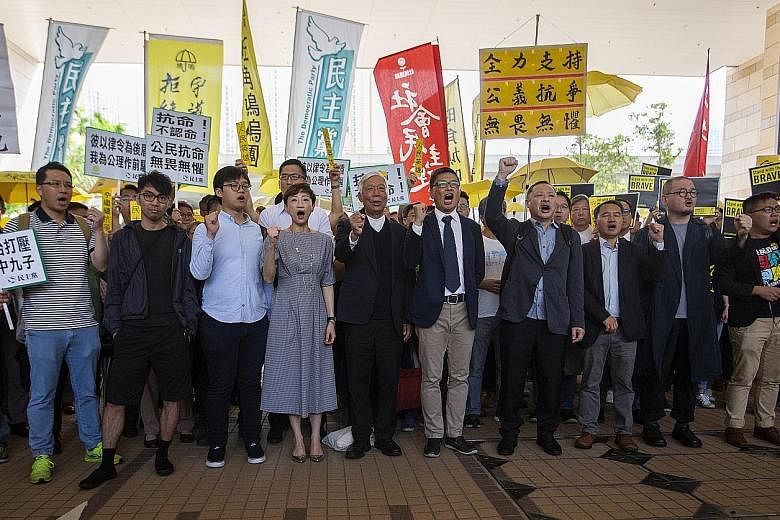The nine leaders behind Hong Kong's Umbrella Movement of 2014 will be sentenced today after they were convicted of public nuisance-related charges connected to the largest civil disobedience movement seen in the city, which brought it to a standstill for months.
All were found guilty yesterday and they now face possible long prison terms. Three of the leaders - sociology professor Chan Kin Man, 60, law professor Benny Tai, 54, and Baptist minister Chu Yiu Ming, 75 - were convicted of conspiracy to cause public nuisance. Chan and Tai were each also convicted of inciting others to cause public nuisance.
Each of the trio had faced three charges - conspiracy to cause public nuisance, incitement to cause public nuisance and incitement to incite public nuisance. All three were acquitted on the last count.
Each charge carries a prison term of seven years.
District Court Judge Johnny Chan wrote in a 268-page judgment that while Hong Kong courts recognised the notion of civil disobedience, it "is not a defence to a criminal charge".
"It is naive to suggest that a concession to introduce the form of universal suffrage advocated by the trio could be made by the government overnight with a click of fingers," he wrote.
Five of the remaining six leaders - Civic Party legislator Tanya Chan, social welfare lawmaker Shiu Ka Chun, former student leaders Tommy Cheung and Eason Chung, and activist Raphael Wong - were each convicted of two charges: inciting others to cause public nuisance and inciting people to incite others to cause public nuisance.
Former legislator Lee Wing Tat was convicted of one count of inciting others to cause public nuisance.
Judge Chan also dismissed suggestions that the charges would have a "chilling effect" on freedom of speech or assembly, or that they would curtail or suppress human rights as the defendants claimed.
But former Hong Kong governor Chris Patten called the verdict "appallingly divisive", adding that the trial was the result of a "vengeful" campaign by the city's authorities.
In a statement issued by British group Hong Kong Watch, he said: "At a time when most people would have thought that the aim of the Hong Kong government should be to bring the whole community together, it seems appallingly divisive to use anachronistic common law charges in a vengeful pursuit of political events which took place in 2014."
China's Foreign Ministry said it supported the Hong Kong government in "punishing" the movement's organisers. Ministry spokesman Lu Kang said yesterday in Beijing: "I also want to remind people in other countries that it is unreasonable to see this as damaging the freedom of Hong Kong society. Just look at what happened in other countries and you can draw a fair conclusion."
All those convicted are out on bail and Judge Chan is expected to hand down sentences this morning after hearing further mitigation pleas.
Yesterday afternoon, both Chan Kin Man and Tai pleaded with the judge through their lawyer to not impose a jail term on Chu as he suffers from a number of medical conditions. Chan and Tai did not submit any mitigation.
Chu made a speech that brought tears to some in the courtroom as he recounted how Tai had asked him to join the "Occupy Central" movement.
Chan, Tai and Chu founded the pro-democracy "Occupy Central" movement in 2013. It later merged with the student-led Umbrella Movement in 2014 as protesters demanded that people be allowed to elect the city's leader, instead of having one appointed by a pro-Beijing committee.
The massive protests, centred in Hong Kong's Central district, led to a gridlock in the city for 79 days.
During the three-week trial, prosecutors argued that the mass protests were a public nuisance as they had caused a "common injury" to the public, who were affected by the blockage of major roads.
Hong Kong's Department of Justice brought charges under the rarely used colonial-era public nuisance category against the Umbrella Movement leaders more than two years after the protests ended, a move criticised by human rights and pro-democracy groups.
Since the protests, several activists have been prosecuted, some jailed, and a number of pro-democracy lawmakers banned from contesting elections.


